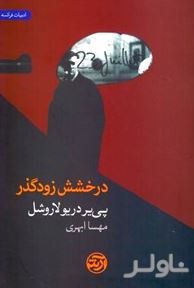
Pierre Eugène Drieu La Rochelle (3 January 1893 in Paris – 15 March 1945 in Paris) was a French writer of novels, short stories and political essays, who lived and died in Paris. He became a proponent of French fascism in the 1930s, and was a well-known collaborationist during the German occupation.
Drieu was born into a middle class, petit bourgeois family from Normandy, based in the 17th arrondissement of Paris. His father was a failed businessman and womanizer who married his mother for her dowry. Although a brilliant student, Pierre failed his final exam at the École Libre des Sciences Politiques. Wounded three times, his experience as a soldier during World War I had a deep influence on him and marked him for the rest of his life.
In 1917, Drieu married Colette Jéramec, the sister of a Jewish friend. The marriage failed and they divorced in 1921. Sympathetic to Dada and to the Surrealists and the Communists, and a close friend of Louis Aragon in the 1920s, he was also interested in the royalist Action Française, but refused to adhere to any one of these political currents. He wrote "Mesure de la France" ("Measure of France") in 1922, which gave him some small notoriety, and edited several novels. He later (beginning in the 1930s) embraced fascism and anti-semitism.
In Drieu's political writings, he argued that the parliamentary system (the gouvernement d'assemblée of the French Third Republic) was responsible for what he saw as the "decadence" of France (economic crisis, declining birth rates, etc.). In "Le Jeune Européen" ("European Youth", 1927) and "Genève ou Moscou" ("Geneva or Moscow", 1928), Drieu La Rochelle advocated a strong Europe and denounced the "decadent materialism" of democracy. He believed that a federal Europe could bolster a strong economic and political union isolated from the imperialist Russians and Americans; in 1939 he came to believe that only Nazi Germany could deliver such an autarkian promise.[1] His pro-European views expressed in 1928 were soon followed by closer contacts with employers' organizations, among them Ernest Mercier's Redressement Français, and then, at the end of the 1920s and the beginning of the 1930s, with some currents of the Radical Party .
From Wikipedia
در واقع، بزرگترین حماقت قرن حاضر این است که پزشک از قدرت اختیار افراد کمک میگیرد، در حالی که خودش وجود این اختیار را نفی میکند، آن را چیزی از پیش تعیین شده در میان سایر موارد مقرر، میداند. اختیار فردی افسانه ای مربوط به دوران دیگری است؛ نسلی که توسط تمدن به تحلیل رفته، قادر نیست به اختیار اعتقاد داشته باشد. بلکه تنها میتواند به جبر پناه ببرد
درخشش زودگذر
پییر دریولاروشل

|
نویسنده :
پییر دریولاروشل
ناشر :
فرهنگ آرش
۳/۹ از ۵
|
۱ |